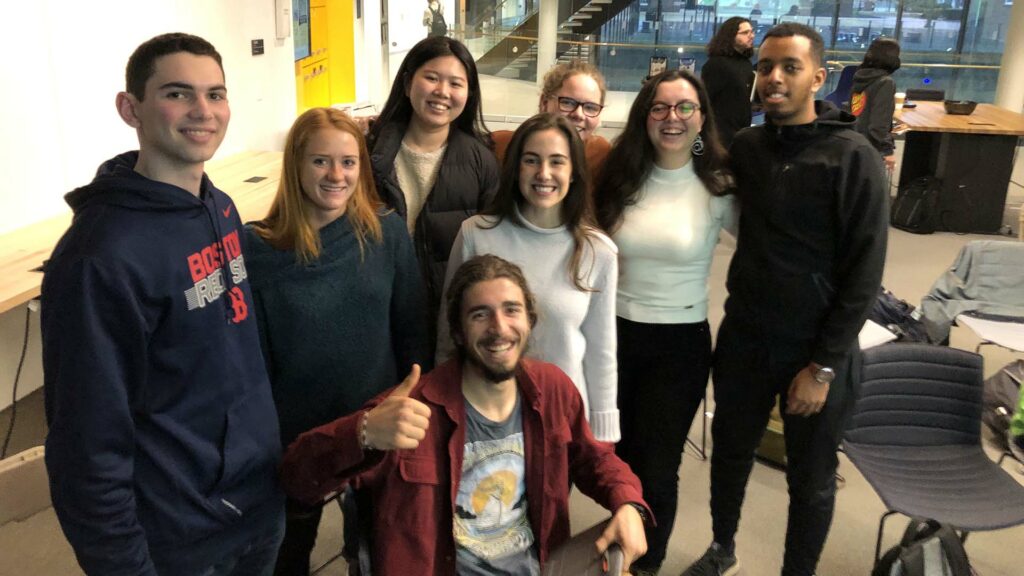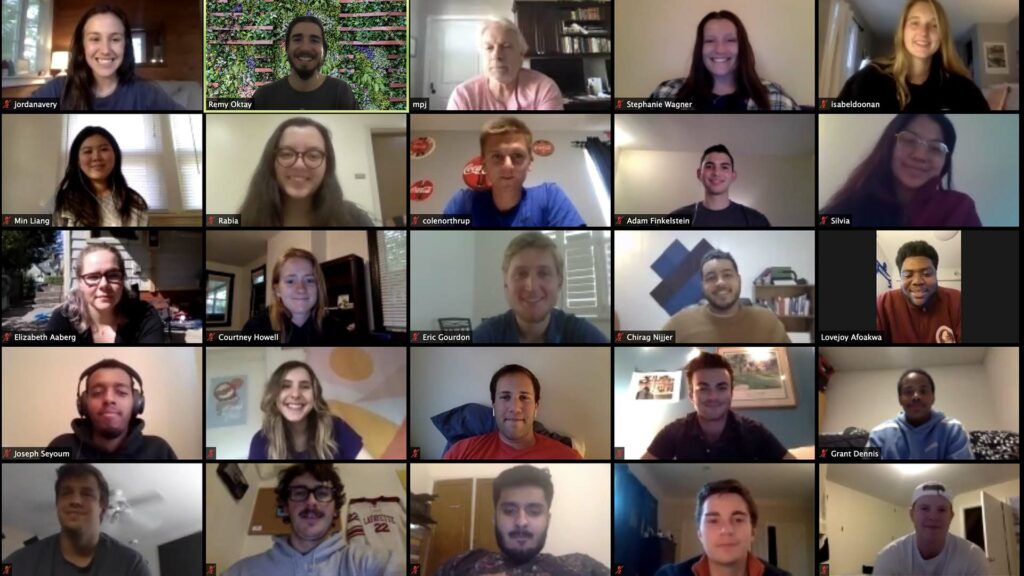Entrepreneur in Residence helps students transform social issues into social solutions
By Stephen Wilson
The world is full of challenges, but learning the broken “systems” behind them takes work, research, and time. Can undergraduate students learn to take the next step: to start impactful ventures that thrive and develop pattern-breaking solutions?
Such is the work of social entrepreneurs.
According to Marty Johnson, Don and Lauren Morel Entrepreneur-in-Residence at the College, a liberal arts background adds competitive advantages to social entrepreneurs.
He should know. As the grandson of sharecroppers, Johnson grew up in poverty, and then spent his life finding innovative ways to solve it as founder and CEO of Isles Inc., a Trenton, N.J.-based urban sustainable development organization that fosters self-reliance and healthy neighborhoods.
Johnson and his two other co-founders formed Isles as Princeton students in 1981. Eventually it became the city’s largest community development organization with a staff of 54 and an annual budget of $6 million. Today, they’re on a mission to spread their learning throughout New Jersey.
Five years ago, Johnson moved into the classroom, bringing a practitioner’s perspective to teaching entrepreneurship, through courses like Rethinking Poverty and So, You Want to Change the World?
“Lafayette students who care about social and environmental challenges have a choice: get angry, get cynical, or become changemakers. Hint: the world has plenty of the first two. If we rely on the skills–and audacity–of young people to solve our future challenges, then they will often be doing that as leaders of private sector organizations,” says Johnson.

Pre-COVID-19 some students from the Social Entrepreneurship class pose together in Dyer Center
For Johnson, successful ventures combine three types of thinking: engineering (Will the product or service work?), business (Do the numbers work?), and social scientist (Who wants this and why?).
“Higher education often separates this thinking into departments, so our job is to chip away at those silos in our brains and in our classrooms,” says Johnson. “We overlay those three types of thinking in our teaching. Then we let students learn by pressure testing their ideas in the world as they build new startup businesses and organizations.”
This semester students in the Social Entrepreneurship course explored their own interests as entrepreneurs, dove into research on entrepreneurship, met entrepreneurs from international and domestic organizations, and learned what Johnson calls the Big 5 Challenges for social entrepreneurs: deciding what to do, funding it correctly, measuring success, finding whom you’re accountable to, and managing the unknowns (political influence and lack of markets for public goods).
Moving from the personal to the intellectual to the experiential, students formed teams and started developing ventures halfway through the semester. They ended the course by pitching startup ventures and drafting 25-page startup business plans.
Three teams developed independent ventures. For example, Cignature uses machine learning to develop customized information and connections to small businesses. Gofer seeks to provide an app for student-to-student delivery and other services on campus. LafKids Connect is developing an after-school, on-campus mentoring program for middle schoolers in partnership with Easton Area Community Center.
 Four other teams researched and developed ways to strengthen Lafayette’s ecosystem for future social entrepreneurs. They interviewed people both on and off campus, studied other institutions’ approaches, and recognized gaps to fill. Their solutions focused on administrative opportunities, curriculum design, new student organizations, and alumni groups.
Four other teams researched and developed ways to strengthen Lafayette’s ecosystem for future social entrepreneurs. They interviewed people both on and off campus, studied other institutions’ approaches, and recognized gaps to fill. Their solutions focused on administrative opportunities, curriculum design, new student organizations, and alumni groups.
“Lafayette students are thinking about problems in the world they care about and want to solve, and it’s important that we provide them the tools and intellectual frameworks they need to address them,” says Yusuf Dahl, Bradbury Dyer III ’64 Director for Innovation and Entrepreneurship.
At the pitch, a panel of judges offered praise along with hard questions … the kinds they have faced as social entrepreneurs.
Judges included Jordan Stallworth, a Princeton junior who started Homeworks Trenton, an after-school boarding program; Alex Meis ’08, co-founder of Kinvolved, a K-12 attendance and communication platform; Robert Hackett, president of the Bonner Foundation, which partners with colleges to build campus civic engagement; and Rachel Hogan-Carr, executive director of the Easton Nurture Nature Center, which educates the public about environmental risks.
Provost John Meier and Dahl rounded out the panel of judges.
“While we hear a lot about great school facilities, teachers, and curriculum, the dirty secret to education is that a student chooses to learn something. What better way to deepen learning than to put students in consequential roles that can benefit others,” says Johnson.
“The Social Entrepreneurship class has by far been the most important and influential class I have taken during my time at Lafayette,” says Jordan Avery ’21. “Professor Johnson has taught us that the most important virtue is courage, and I now understand that this can be seen in business as well as throughout our lives.”
That courage has inspired action.
“Seeing how impactful the teams have been throughout a single semester has inspired me to kick-start a multiyear social entrepreneurship venture and work to make this same impactful learning accessible to incoming classes at Lafayette,” says Remy Oktay ’23, teaching assistant in the course.
“The students in the class find it very meaningful because we can leave a lasting positive impact by creating initiatives that are mutually beneficial for the Easton and Lafayette communities,” says Adam Finkelstein ’20.

 Four other teams researched and developed ways to strengthen Lafayette’s ecosystem for future social entrepreneurs. They interviewed people both on and off campus, studied other institutions’ approaches, and recognized gaps to fill. Their solutions focused on administrative opportunities, curriculum design, new student organizations, and alumni groups.
Four other teams researched and developed ways to strengthen Lafayette’s ecosystem for future social entrepreneurs. They interviewed people both on and off campus, studied other institutions’ approaches, and recognized gaps to fill. Their solutions focused on administrative opportunities, curriculum design, new student organizations, and alumni groups.